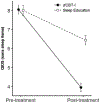Efficacy of digital CBT for insomnia to reduce depression across demographic groups: a randomized trial
- PMID: 29792241
- PMCID: PMC7050476
- DOI: 10.1017/S0033291718001113
Efficacy of digital CBT for insomnia to reduce depression across demographic groups: a randomized trial
Abstract
Background: Insomnia and depression are highly comorbid and mutually exacerbate clinical trajectories and outcomes. Cognitive behavioral therapy for insomnia (CBT-I) effectively reduces both insomnia and depression severity, and can be delivered digitally. This could substantially increase the accessibility to CBT-I, which could reduce the health disparities related to insomnia; however, the efficacy of digital CBT-I (dCBT-I) across a range of demographic groups has not yet been adequately examined. This randomized placebo-controlled trial examined the efficacy of dCBT-I in reducing both insomnia and depression across a wide range of demographic groups.
Methods: Of 1358 individuals with insomnia randomized, a final sample of 358 were retained in the dCBT-I condition and 300 in the online sleep education condition. Severity of insomnia and depression was examined as a dependent variable. Race, socioeconomic status (SES; household income and education), gender, and age were also tested as independent moderators of treatment effects.
Results: The dCBT-I condition yielded greater reductions in both insomnia and depression severity than sleep education, with significantly higher rates of remission following treatment. Demographic variables (i.e. income, race, sex, age, education) were not significant moderators of the treatment effects, suggesting that dCBT-I is comparably efficacious across a wide range of demographic groups. Furthermore, while differences in attrition were found based on SES, attrition did not differ between white and black participants.
Conclusions: Results provide evidence that the wide dissemination of dCBT-I may effectively target both insomnia and comorbid depression across a wide spectrum of the population.
Keywords: CBT-I; Clinical Trial Identifier: NCT02988375; Clinical Trial Registry: clinicaltrials.gov; Internet; depression; insomnia.
Figures





Similar articles
-
Depression prevention via digital cognitive behavioral therapy for insomnia: a randomized controlled trial.Sleep. 2019 Oct 9;42(10):zsz150. doi: 10.1093/sleep/zsz150. Sleep. 2019. PMID: 31535688 Free PMC article. Clinical Trial.
-
Digital CBT-I in Comorbid Insomnia and Depression: Clinical Outcomes From a Pragmatic Randomized Controlled Trial.Depress Anxiety. 2025 May 26;2025:2171041. doi: 10.1155/da/2171041. eCollection 2025. Depress Anxiety. 2025. PMID: 40458292 Free PMC article. Clinical Trial.
-
Does online insomnia treatment reduce depressive symptoms? A randomized controlled trial in individuals with both insomnia and depressive symptoms.Psychol Med. 2019 Feb;49(3):501-509. doi: 10.1017/S0033291718001149. Epub 2018 May 11. Psychol Med. 2019. PMID: 29747706 Free PMC article. Clinical Trial.
-
The efficacy of digital cognitive behavioral therapy for insomnia and depression: a systematic review and meta-analysis of randomized controlled trials.PeerJ. 2023 Oct 31;11:e16137. doi: 10.7717/peerj.16137. eCollection 2023. PeerJ. 2023. PMID: 37927792 Free PMC article.
-
Digital Delivery of Cognitive Behavioral Therapy for Insomnia.Curr Psychiatry Rep. 2019 Jun 4;21(7):50. doi: 10.1007/s11920-019-1041-0. Curr Psychiatry Rep. 2019. PMID: 31161406 Free PMC article. Review.
Cited by
-
Prevention of Pain Interference in Insomnia Patients via Digital Cognitive-Behavioral Therapy for Insomnia.Behav Sleep Med. 2025 May 5:1-13. doi: 10.1080/15402002.2025.2500519. Online ahead of print. Behav Sleep Med. 2025. PMID: 40324067
-
The Role of Acupuncture in the Management of Insomnia as a Major or Residual Symptom Among Patients With Active or Previous Depression: A Systematic Review and Meta-Analysis.Front Psychiatry. 2022 Apr 15;13:863134. doi: 10.3389/fpsyt.2022.863134. eCollection 2022. Front Psychiatry. 2022. PMID: 35492706 Free PMC article.
-
We know CBT-I works, now what?Fac Rev. 2022 Feb 1;11:4. doi: 10.12703/r/11-4. eCollection 2022. Fac Rev. 2022. PMID: 35156100 Free PMC article. Review.
-
Cognitive-behavioral treatment for insomnia and mindfulness-based stress reduction in nurses with insomnia: a non-inferiority internet delivered randomized controlled trial.PeerJ. 2024 Jul 24;12:e17491. doi: 10.7717/peerj.17491. eCollection 2024. PeerJ. 2024. PMID: 39071123 Free PMC article. Clinical Trial.
-
Preliminary Evidence of Sleep Improvements Following Psilocybin Administration, and their Involvement in Antidepressant Therapeutic Action.Curr Psychiatry Rep. 2024 Nov;26(11):659-669. doi: 10.1007/s11920-024-01539-8. Epub 2024 Nov 13. Curr Psychiatry Rep. 2024. PMID: 39532819 Free PMC article. Review.
References
-
- American Psychiatric Association (2013) Diagnostic and Statistical Manual of Mental Disorders (DSM-5®). Arlington, VA: American Psychiatric Pub.
-
- Baglioni C, Battagliese G, Feige B, Spiegelhalder K, Nissen C, Voderholzer U, Lombardo C and Riemann D (2011) Insomnia as a predictor of depression: a meta-analytic evaluation of longitudinal epidemiological studies. Journal of Affective Disorders 135, 10–19. - PubMed
-
- Batterham PJ, Christensen H, Mackinnon AJ, Gosling JA, Thorndike FP, Ritterband LM, Glozier N and Griffiths KM (2017) Trajectories of change and long-term outcomes in a randomised controlled trial of Internet-based insomnia treatment to prevent depression. British Journal of Psychiatry Open 3, 228–235. - PMC - PubMed
Publication types
MeSH terms
Grants and funding
LinkOut - more resources
Full Text Sources
Other Literature Sources
Medical

